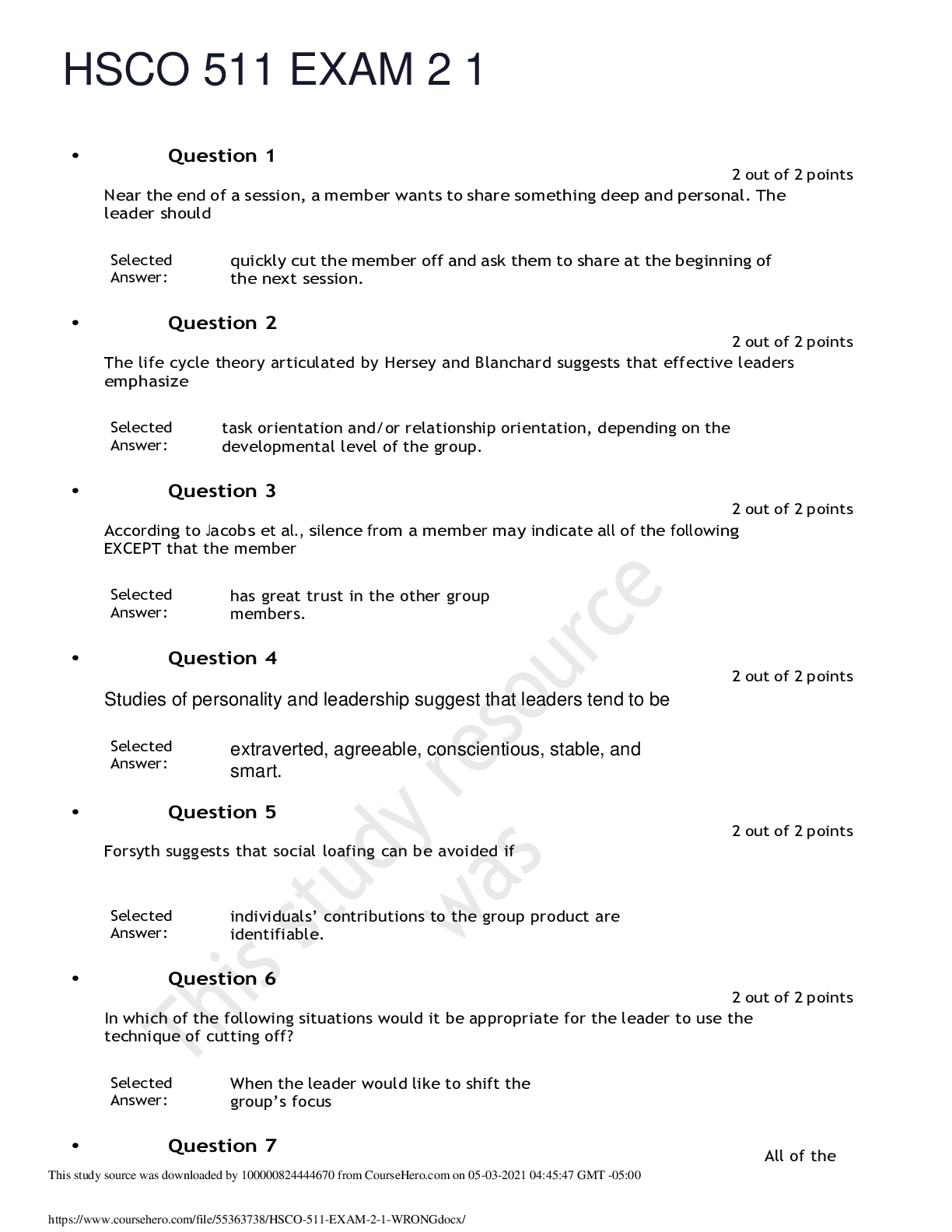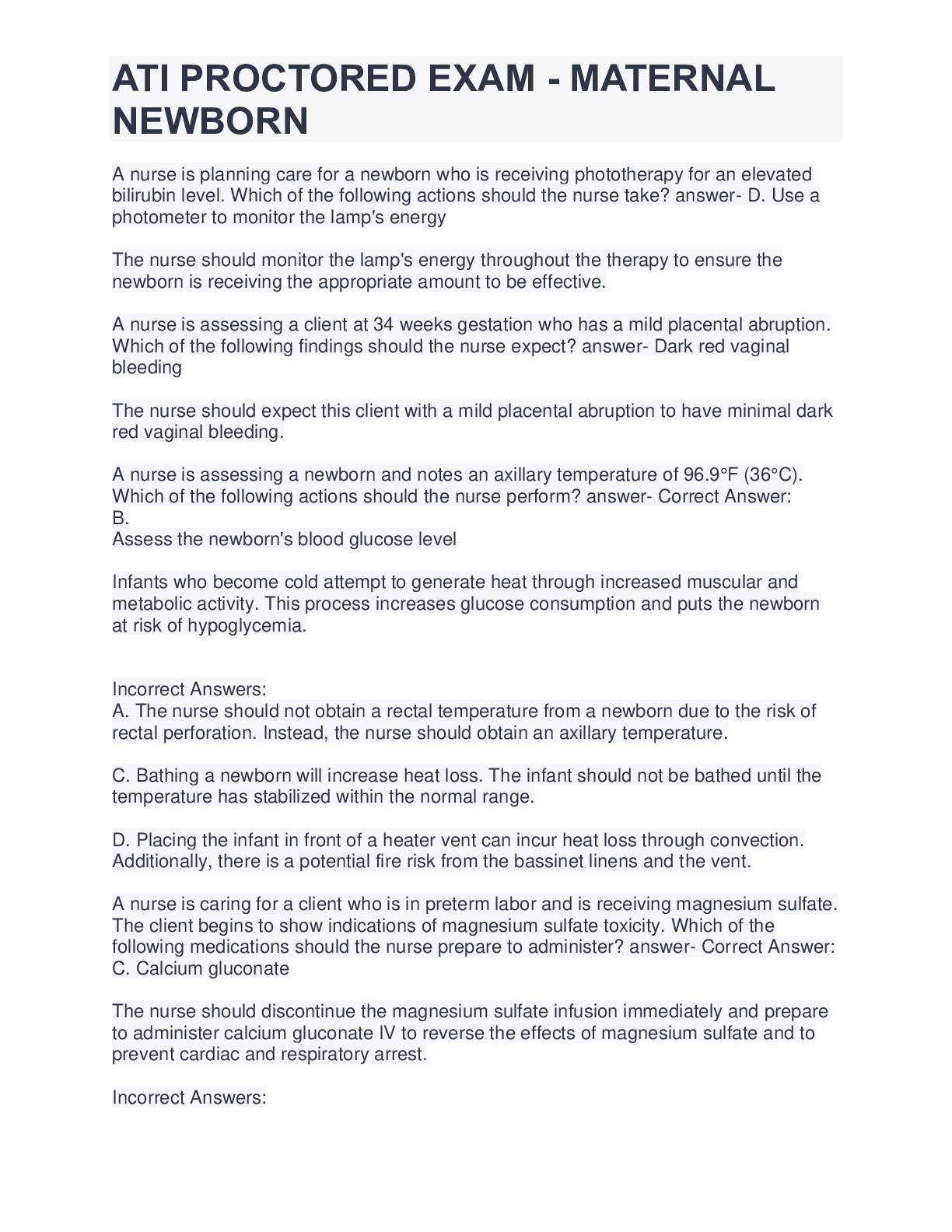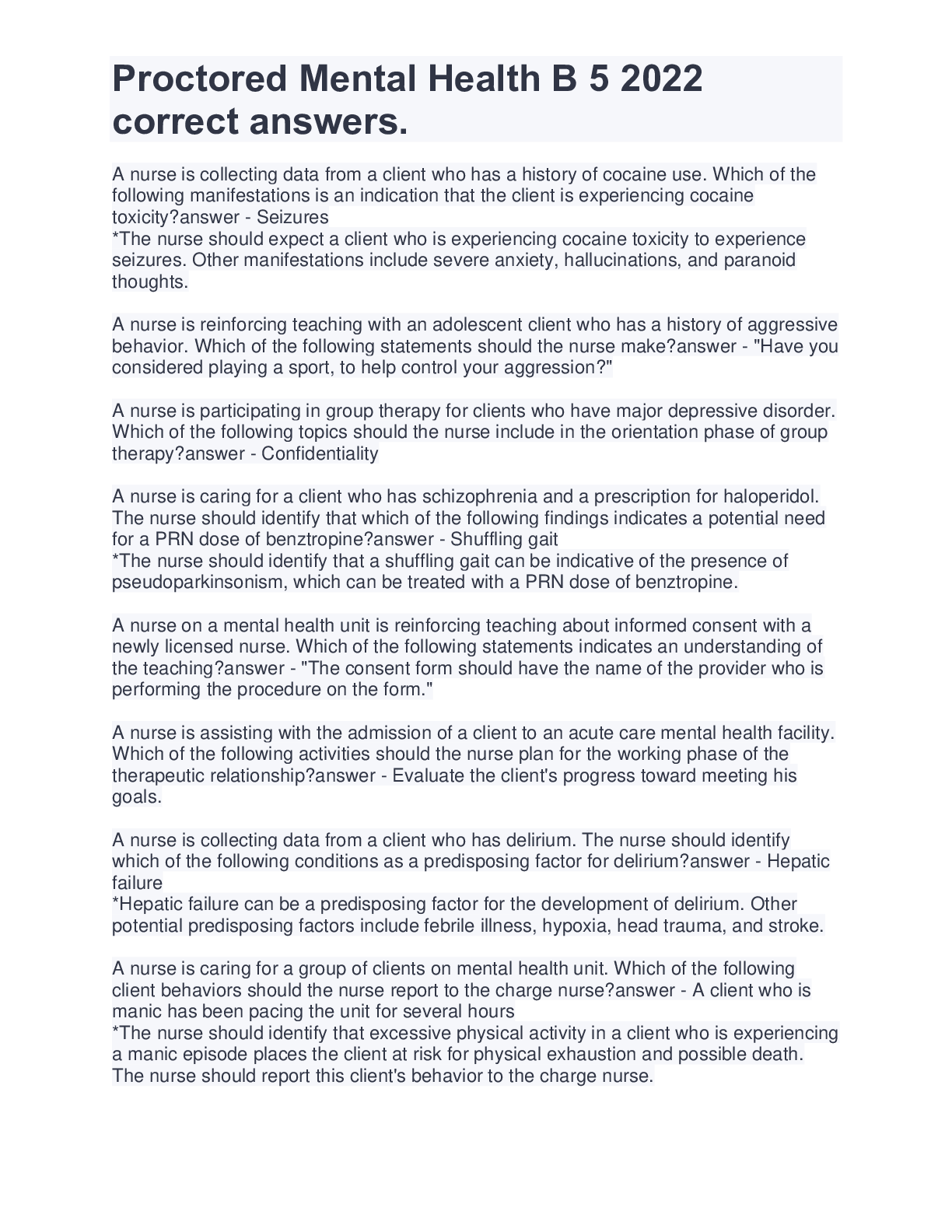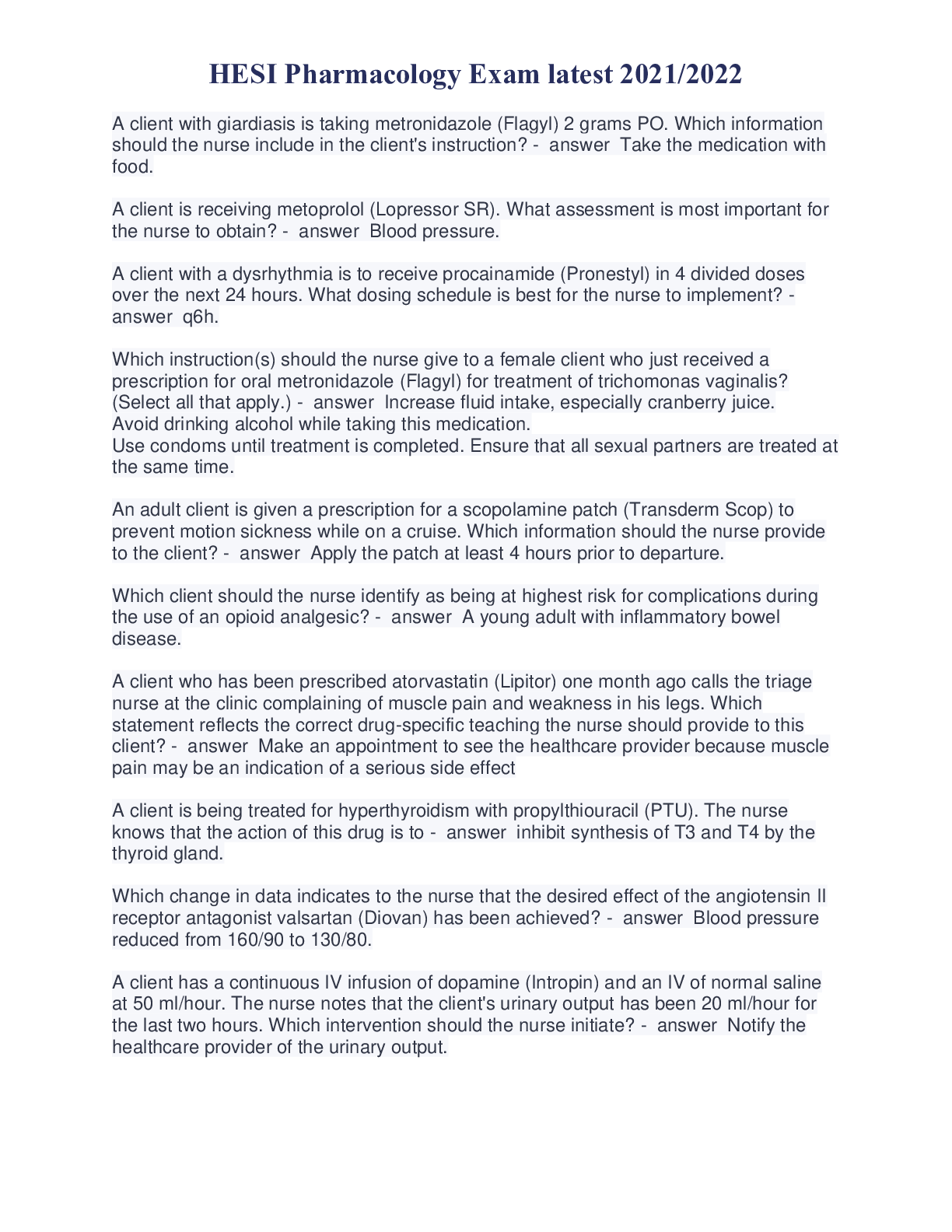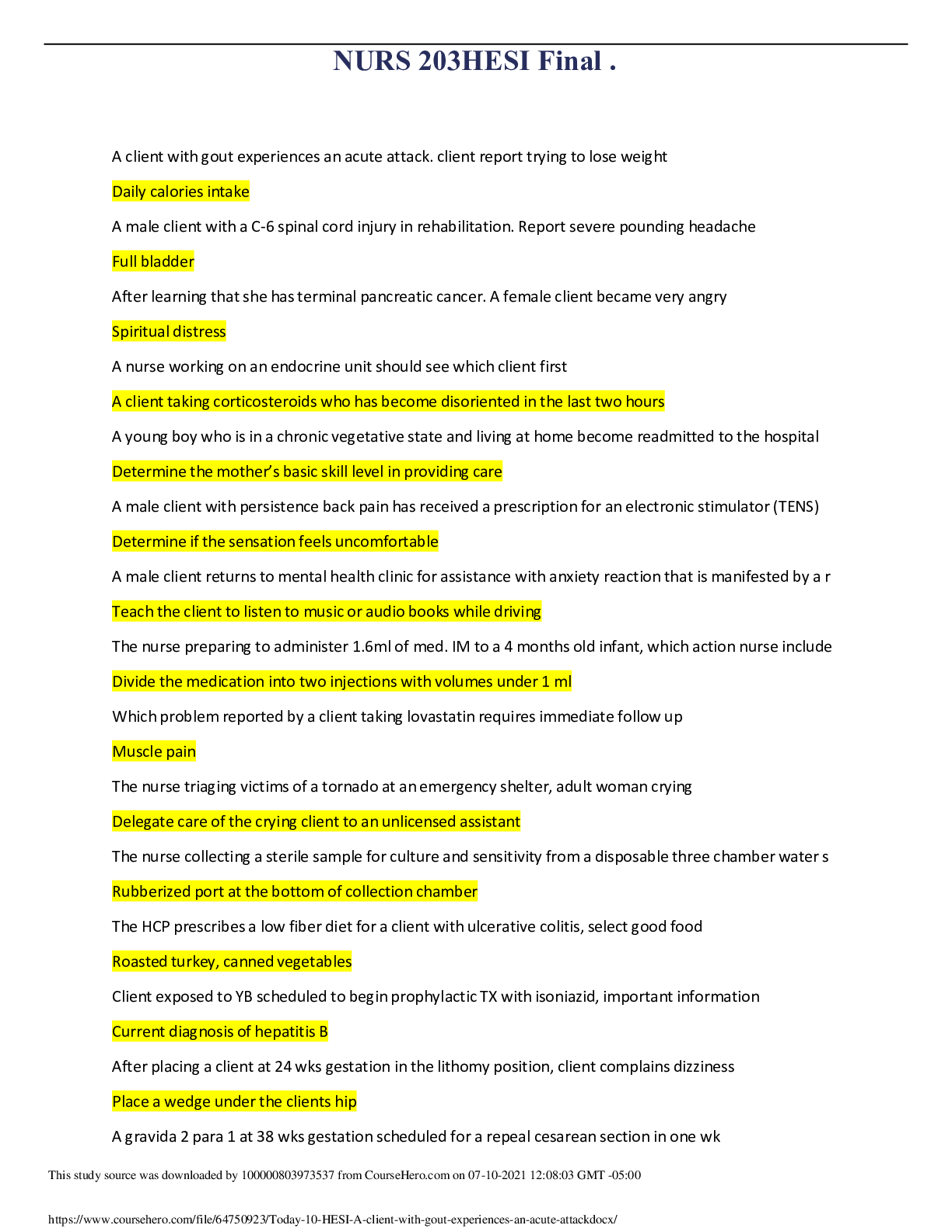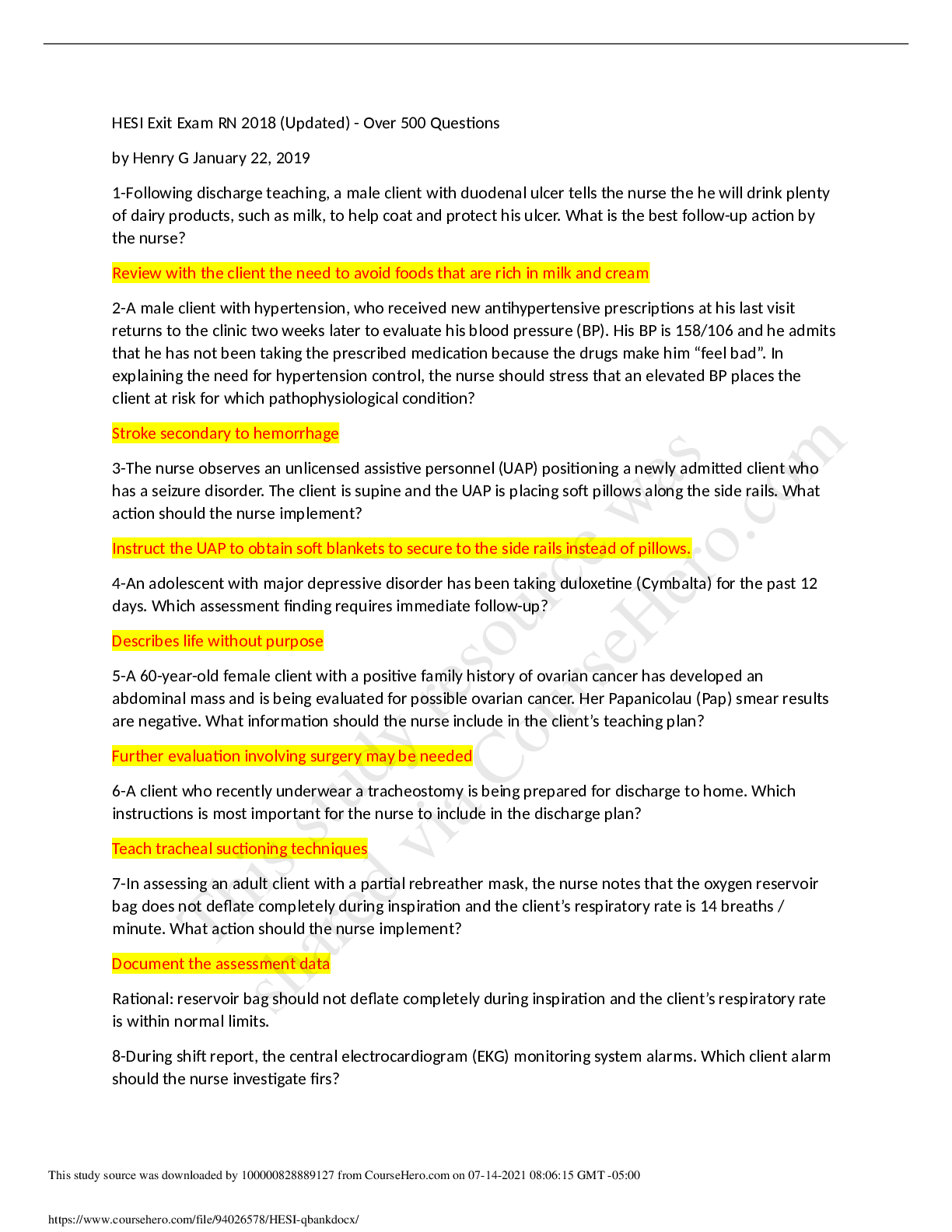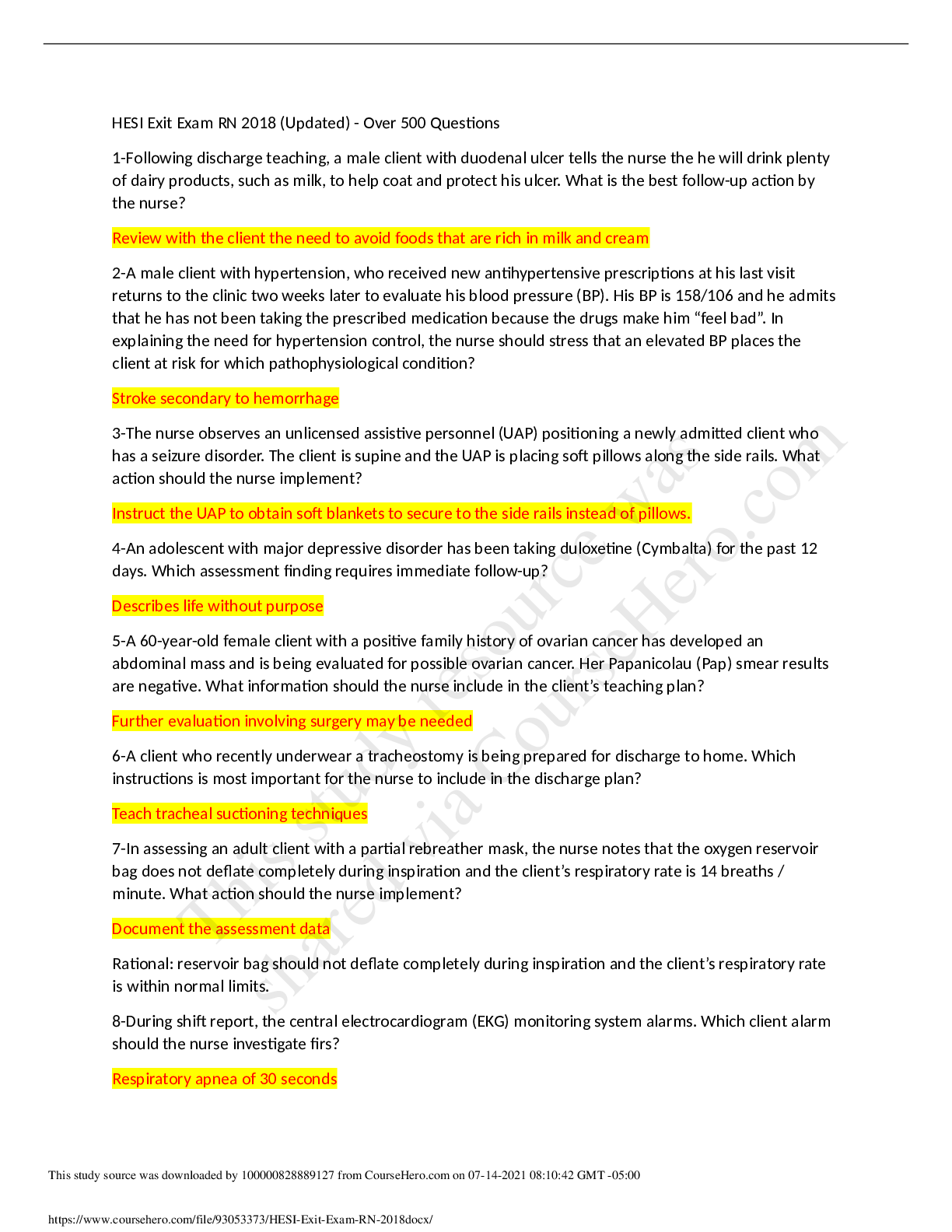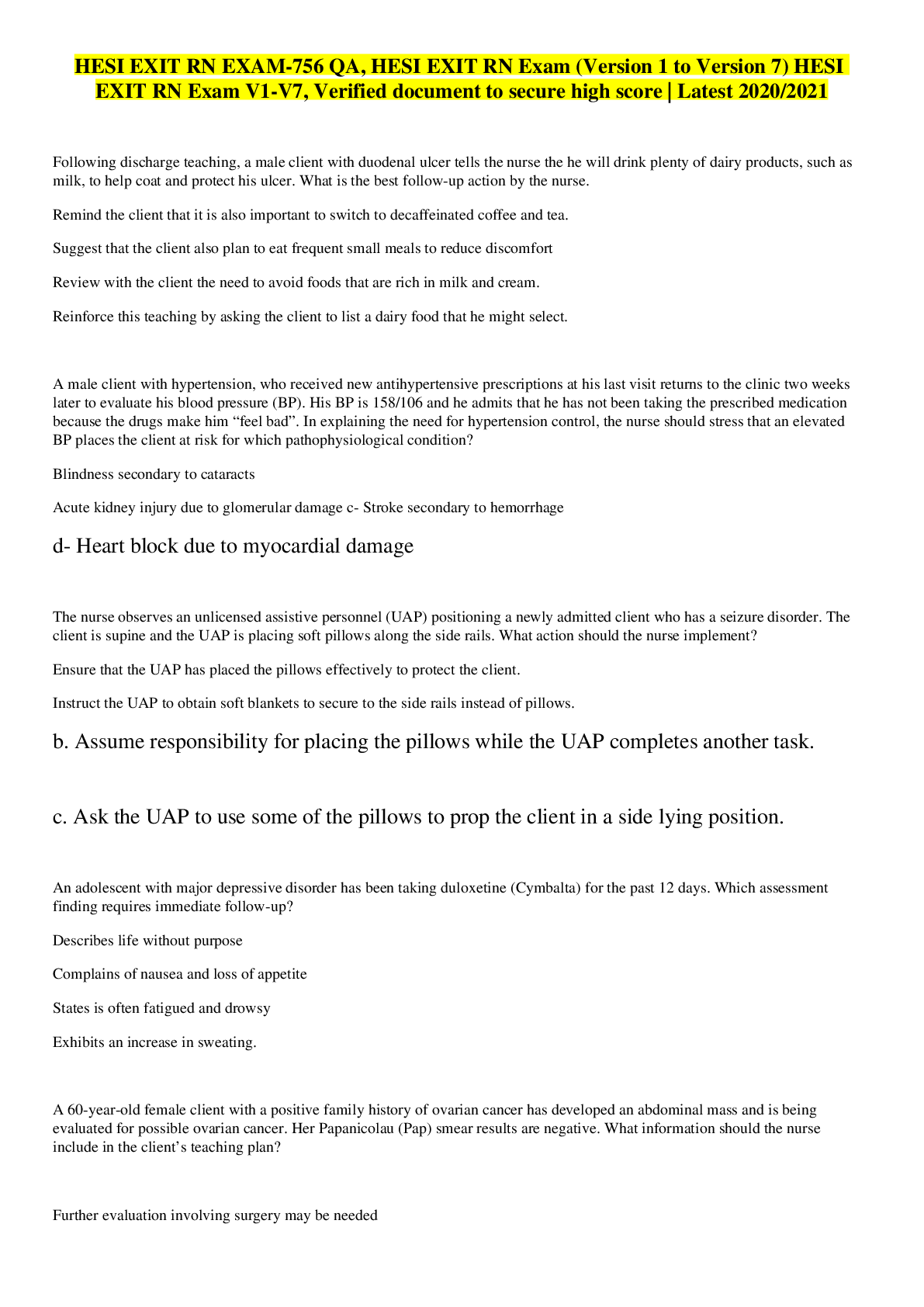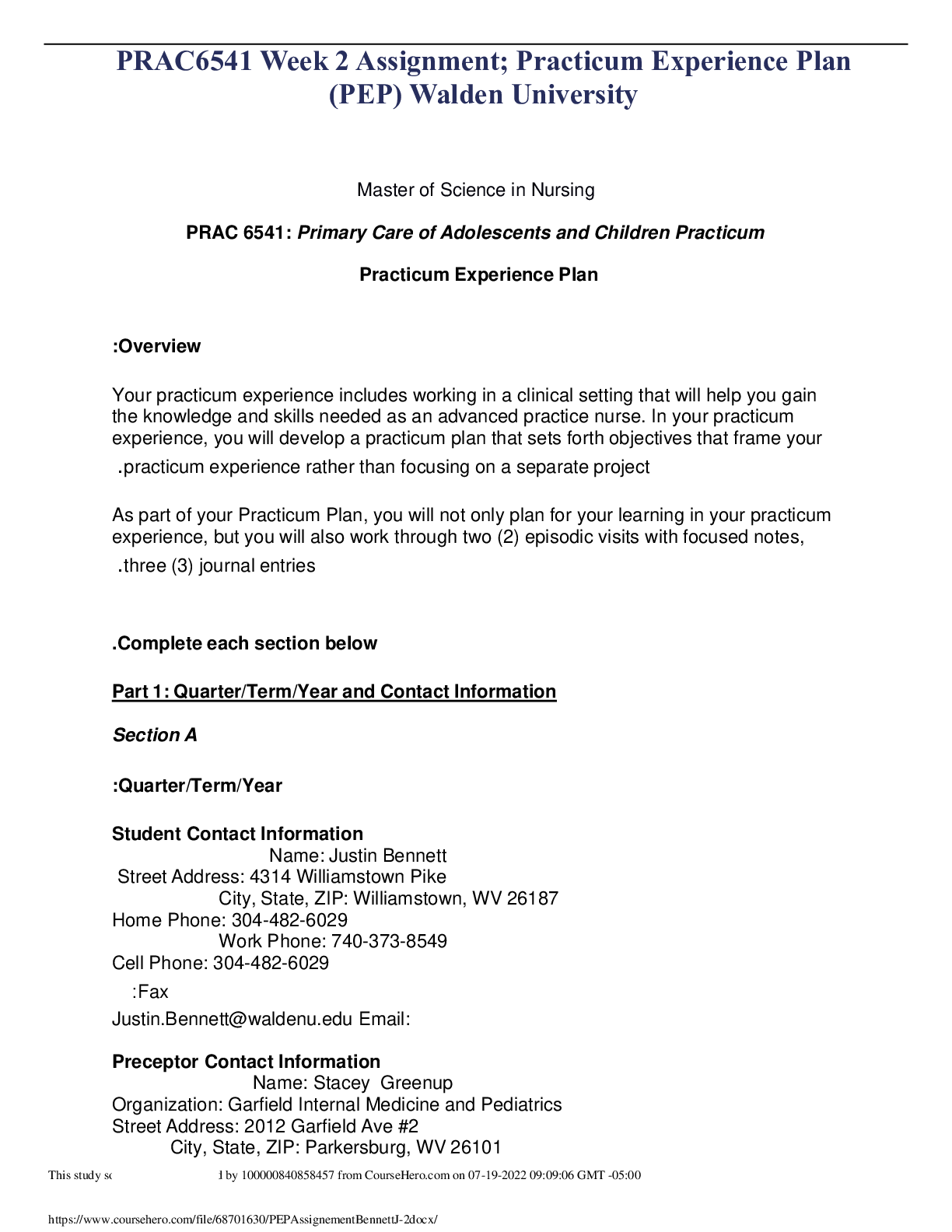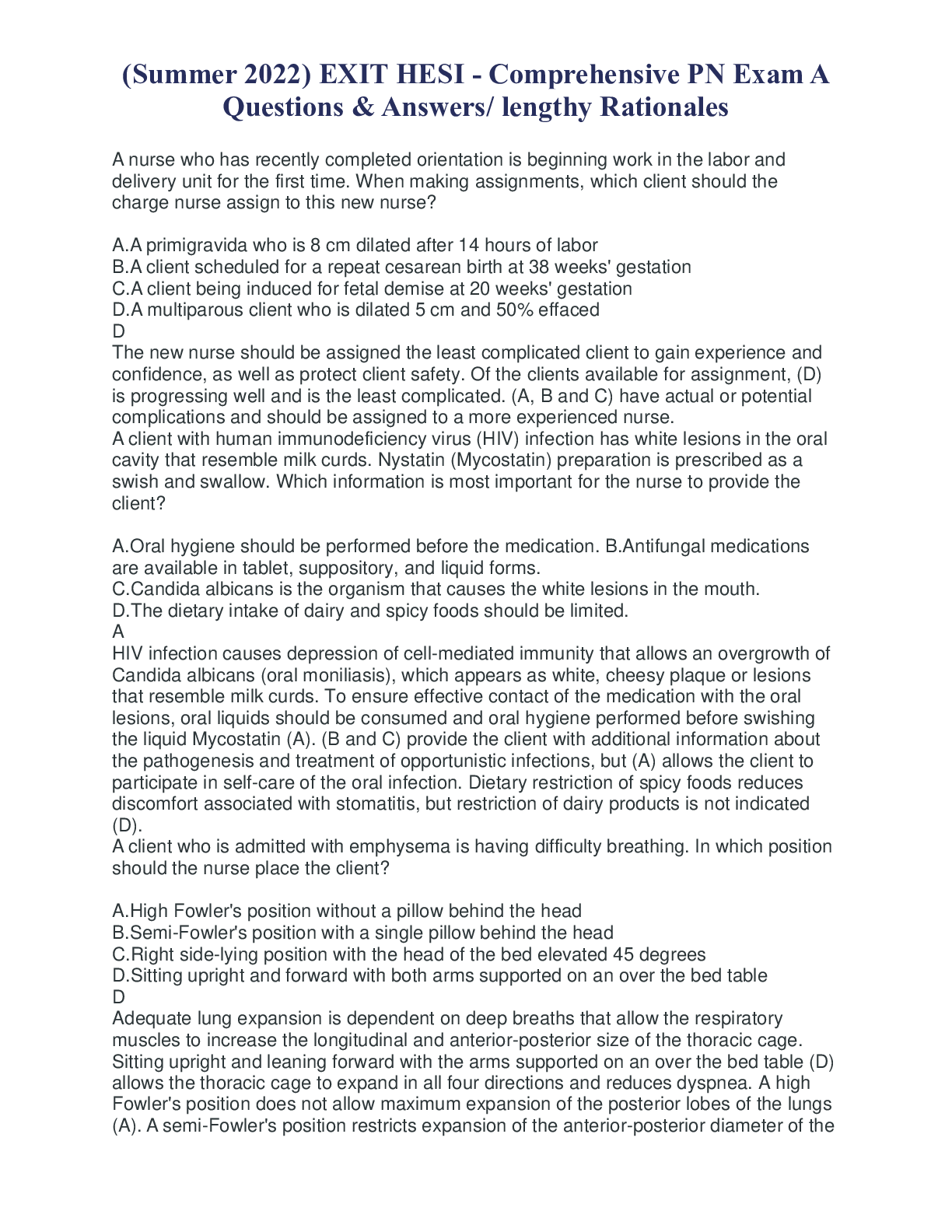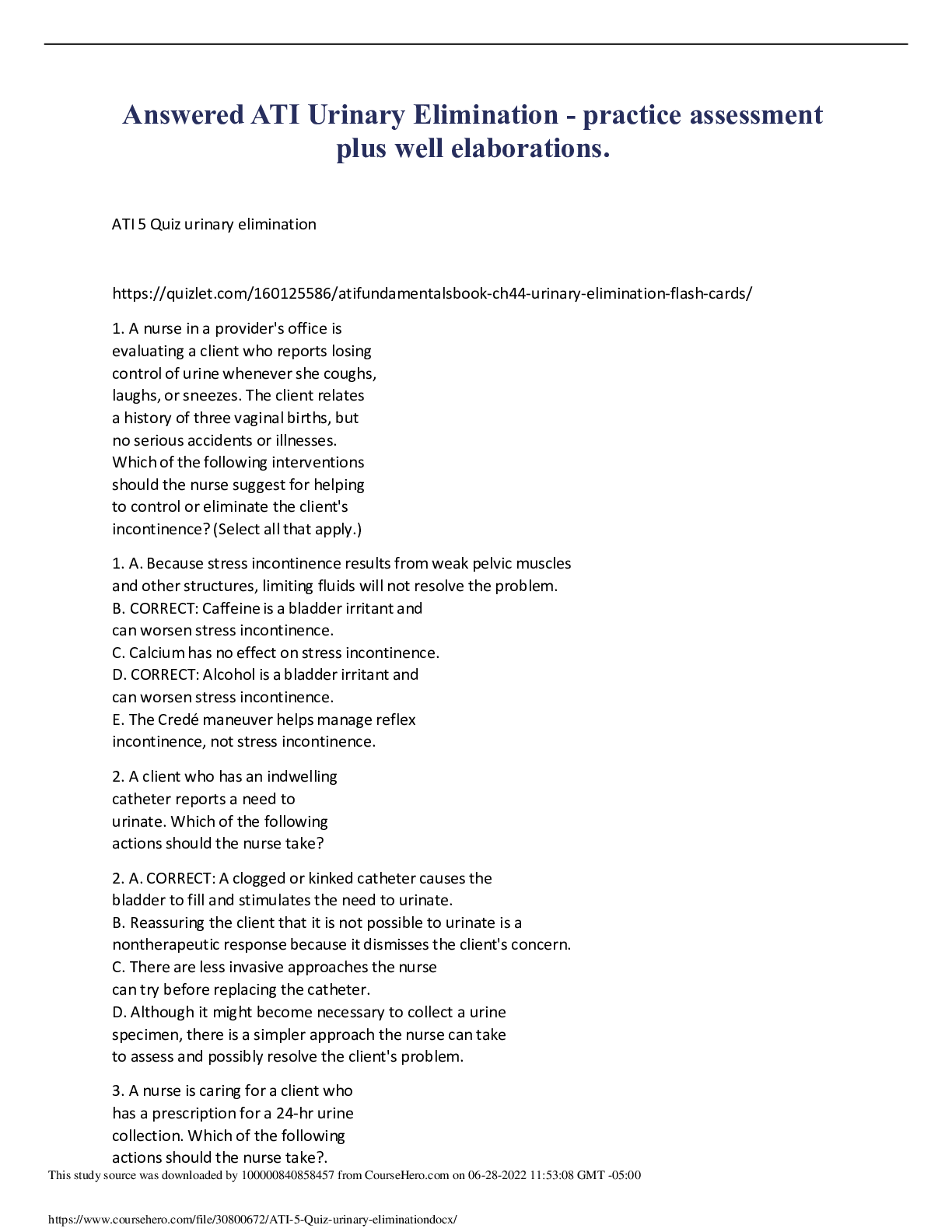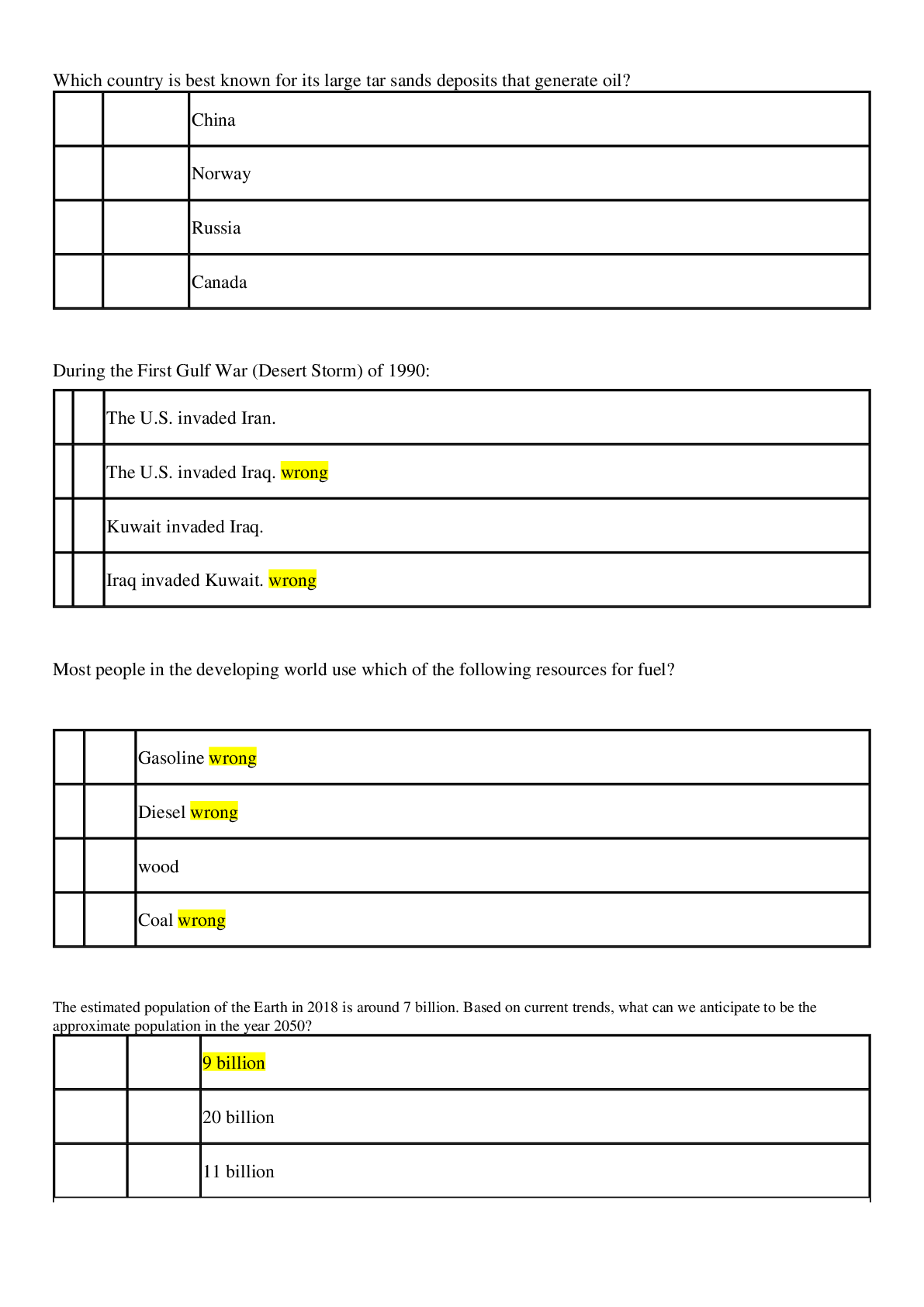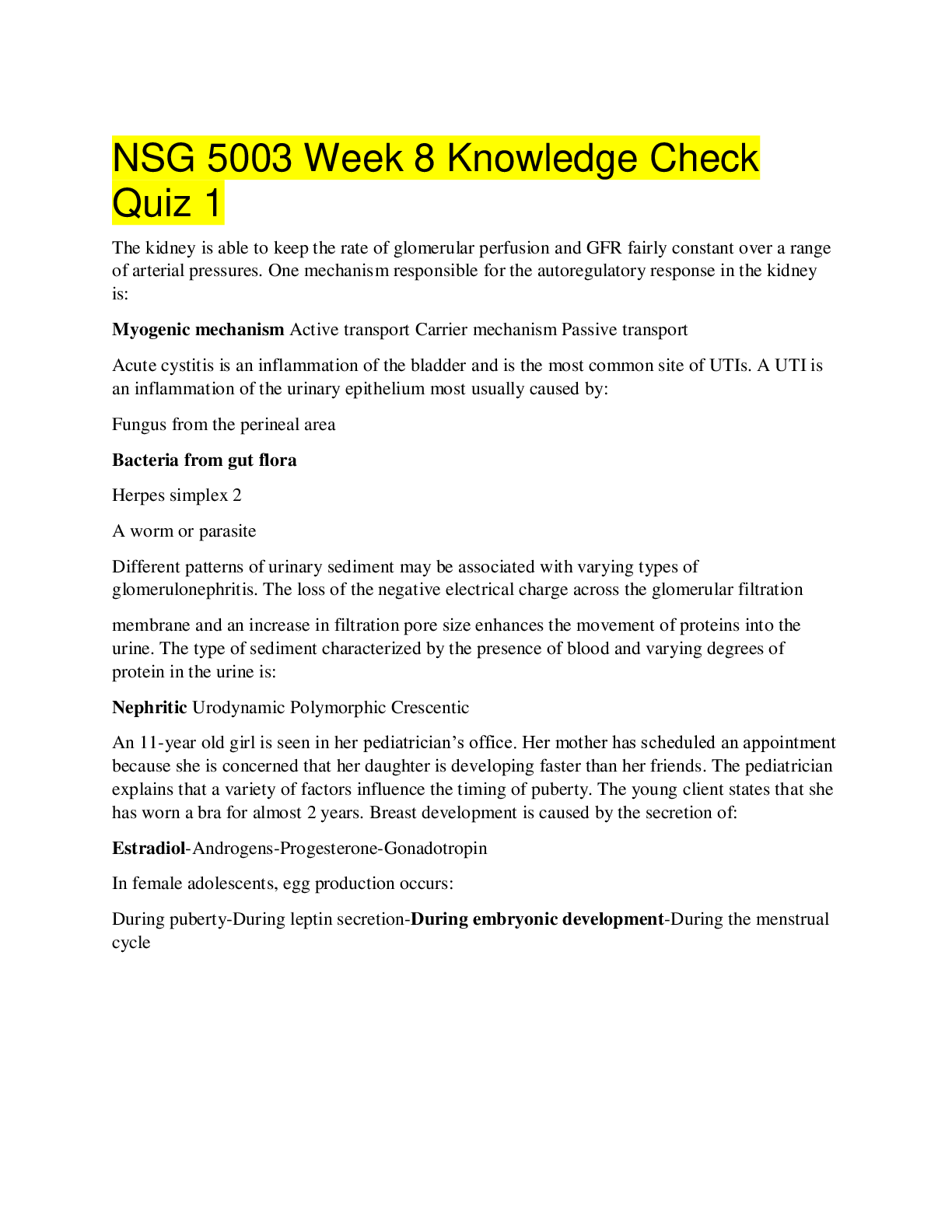SOUTH UNIVERSITY NSG 5000 KNOWLEDGE CHECK QUIZ 1 THROUGH 5 ANSWERS
Document Content and Description Below
1.Which definition distinguishes Advanced Nursing Practice (ANP) from Advance PracticeNursing(APN)? The integration and application of a broad range of theoretical and evidenced based knowledge that ... occurs as part of graduate education The ANP and APN are indistinguishable and the broad definition is best described in specific roles The integration of all levels and specializations in nursing that directs direct patient care to individual patients, families and communities The progression of the nurse to any advanced role that elevates clinical decision making that is gained through work experience and continuing education 2. Which factors best differentiates basic nursing practice from advance practice nursing? Increased role autonomy; Supervision or collaboration with physician and execution of joint orders Lateral role autonomy; Independence from most disciplines; Regulations govern Increased role autonomy; Interprofessional decision making; Disease management Increased role autonomy; Elevated clinical decision making; Integration of health promotion; Management of acute and chronic conditions; and Collaboration with other disciplines 3. What is the purpose of a conceptual model? To provide the most appropriate ways to view the subject matter of a discipline To benefit patients, nurses, and other stakeholders by offering a systematic approach to nursing research, education, administration, and practice To provide practical benefits of communication, reduce conflict, and provide a consistent approach of advanced practice nursing To associate levels of nursing practice, research and theory development when planning curricula, course content, and clinical experiences for preparing APNS 4. What are the issues related to concepts, models, and theories of advanced practice nursing? Inapplicable from the real world of direct patient care and patient outcomes Abstract thinking and lack evidenced based research (EBR) support Confusing to students in transition, who are excited about learning new ways of caring for patients Preparation, promulgating of policies, and employment of EBR to impact patient outcomes needs to be consistent 5.Which of the following of the three below are APRN roles? CNMs (certified nurse midwives) CNS(certified Nurse specialists) CNL (clinical nurse leader) CRNAs (certified registered nurse anesthetists) Week 2 Knowledge Check 1. Which of the following assumptions best supports evidence-based practice in nursing? Nursing integrates science and the applied practice of medicine. YES Nursing seeks to apply evidence-based practices as they fit into existing organizational systems and standards. Organizational policy development and implementation should serve as an organization’s roadmap for best practices. In decision-making, the best available evidence may supersede patient preference if mental illness is presented in the patient. 2. The advance practice nurse suspects that her patient is a victim of domestic violence, but the patient denies. The two options wage the decision to confront with the decision to preserve the patient-provider relationship. This is considered: Moral Distress Moral Uncertainty Moral Dilemma—YES Moral Distraction 3. The nurse in advance practice understands which changes in American health care have contributed to a movement toward wellness, rather than illness management? The provision of “boutique” health services, such as yoga and other non-traditional practices, has been a major influence on wellness promotion. Reduction in costs of health services (largely influenced by the Affordable Care Act) and a cultural value shift toward health maintenance contributed to the increased attention on wellness rather than illness. YES A major decrease in pain medication treatment and overall high costs of health care have caused many Americans to turn to wellness practices, like daily exercise routines. Most employers now offer wellness programs for employees and often even provide financial benefits if employees use them regularly 4. The nurse manager would like to address cultural insensitivity demonstrated by staff in a recent interaction with a patient. What statement reflects leadership skills of advance practice? The supervisor can implement training on cultural awareness to improve the team’s cross-cultural communication skills. YES The supervisor should reprimand all staff who demonstrated poor communication skills in order to deter future insensitive behavior. The supervisor should send a clearly written email to the team providing good and bad examples of cultural insensitivity in order to educate staff without making them feel uncomfortable. The supervisor should review this behavior with relevant staff members during a professional evaluation period. 5.The nurse in an advance practice role recognizes which statement represents a major benefit to a medical team when team members effectively collaborate and communicate? When collaborating well, team members will be better informed with shared information, they will be better able to treat patients, and public perception of positive collaboration will help with building community trust. YES Team members will experience less stress, which will create a more peaceful work environment. The provider will reduce costs by being able to have fewer staff training sessions. With timesaving through collaboration, shift demands on nursing could decrease. 6. Sallie is an experienced Nurse practitioner who practices autonomously in a rural clinic. She regularly precepts students and guest lectures to several graduate NP programs, writes weekly newspaper columns on prevention and health promotion and works closely with her legislature on health care policies and bills that would ensure access care and promote patient outcomes. Sallie’s work is best described by which Advanced practice nurse competencies. a) Collaboration b) Consultation c) leadership- YES d) coaching South University NSG 5000 Role of the Advanced Practice Nurse: Transformational Leadership in Advanced Practice Week 3 Knowledge Check 1. A nurse practitioner (NP) knows that she is HIV positive. She is employed in a private clinic and performs wellness exams on ambulatory adults. The NP: a. Is obligated to inform her employer of her HIV status. b. Is obligated to inform her patients of her HIV status. c. Is under no obligation to inform anyone. d. Is under obligation to inform the patient if she performs invasive procedures. 2. Anne and Laura work as NP partners in an NP practice. Anne learns that Laura frequently changes patient’s narcotic prescriptions to a different dosage, and then requests that the patient give her the remaining narcotic medications. Some patients have called Anne aside to tell her of this. How can Laura’s actions best be characterized? a. Laura is committing theft. b. Laura’s behavior is not illegal but is unethical. c. Requesting the patient’s medication is within Laura’s scope of practice. d. This appears to be diversion of medications by Laura. 3. A liability policy that pays claims only during the period that the policy is active is termed: a. claims made policy. b. tail coverage. c. liability protection. d. bobtail coverage. 4. A NP examined a patient who had been bitten by her husband during an assault. There were numerous bite marks and lacerations on the patient’s forearms. The nurse practitioner sutured the lacerations, though this was contraindicated because of the highly infectious nature of human bites. The patient suffered no ill effects after suturing. How can this be described? a. This is negligence. b. This was a fortunate situation for the patient. c. This is malpractice. d. This is poor judgment and malpractice. 5. Concrete strategies used to keep the client’s attention as the NP institutes client education include a. providing the education session immediately after lunch. b. going over the materials more than once. c. translating theoretical information into practical terms. d. using repetition. 6. According to the health belief model, motivation, or readiness to act, is determined by which of the following components a. perceived threat, efficacy, benefits of action, and perceived barriers to action b. education and positive reinforcement c. predisposing factors, reinforcing factors, and enabling factors. d. self-efficacy theory and perceived ability to act wrong 7. Which is the best method for evaluating the efficacy of a new clinical intervention? a. A case report b. A descriptive study c. A randomized, controlled clinical trial d. A correlational study 8. As an APRN, you begin a new job in a small practice with two other physicians. You have been hired to be a partner in the practice, but the eldest partner is reluctant to allow you to take on new clients. This is an example of a. role stress b. role strain c. role insufficiency. d. role conflict. 8. Which of the following statements is true about case management? Case Management a. oversees the client throughout acute care hospitalization. b. is organized around a system of interdisciplinary resources and services. c. depends on physician-driven leadership to oversee the illness episode. d. is applicable to the rehabilitative portion of the episode of the illness. 9. Usual and customary refers to a. an insurance term for how a charge compares with charges made to another person receiving similar services and supplies. b. How an insurer evaluates the need for an ordered diagnostic test. c. A comparison of interventions across populations. d. How much an insurer will charge to provide coverage? 10. Reviewing the literature refers to the ability to research existing literature about a specific problem, whether clinical or policy. The most important skill necessary to performing a thorough review of the literature is a. talking with colleagues about the sources. b. attending a research conference. c. critiquing the findings and synthesizing the results. d. reviewing clinical journals. Week 4 Knowledge Check Question 1 (1 point) Of the following statements, which three are accurate concepts to apply to APRNs? Question 1 options: Incorporation and integration of business practices with clinical practice expertise is essential. No one program can prepare for all avenues of practice with specialty practices becoming more common and require additional endorsements and certifications Advanced Practice Nursing is a replacement to medical practice. More studies differentiating basic from advanced practice nursing and the impact on patient outcomes are needed. Question 2 (1 point) What three triads provide a framework for Advance practice health policy issues? Question 2 options: a) expert, equal and comparable care solutions to that of physicians b) cost-quality-access patient centered solutions c) population foci, preventive and health promotion solutions d) collective, coalitions and unity of all nursing organizations is the solution Question 3 (1 point) In 2008, the AACN, NCSBN, and other organizations representing APNs formed the APRN dialogue group to produce a model that includes important definitions, roles and titles to be used, population foci, specialties, and preparation for emerging new APRN roles. This model is known as the: Question 3 options: a) Hamric’s Integrative Model of Advanced Practice Nursing b) Calkin’s Model of Advanced Practice Nursing c) Consensus Model for Advanced Practice Registered Nurse Regulation d) Strong Memorial Hospital’s Model of Advanced Practice Nursing Question 4 (1 point) What are the three global issue(s) related to impeding advance practice: Question 4 options: Titling Lack of Physician support and required supervision Role conflict and power struggles between basic nursing and advance nursing practice Utilization of EBR to guide standards of practice Question 5 (1 point) What is the first organizational step of influencing health policy to make changes? Question 5 options: a) defining and documenting problems b) drafting rules c) educating policymakers on the problems d) educating the public on the need for change Week 5 Knowledge Check What best demonstrates the advanced practice registered nurse professional leadership Which APN role was purposely created to be broad in scope but in recent years that broadness has caused challenges understanding exactly what they can do? The scope of practice of an Adult/Gerontological PC NP allows evaluation of what age group of patients? The AGNP working in primary care is made aware of a denial of services for one of her patients. Which action demonstrates an appropriate competency and skill? The adult-gerontology primary care nurse practitioner is appointed to a hospital’s multidisciplinary medical ethics review committee. What is the role of the nurse practitioner on this committee? [Show More]
Last updated: 1 year ago
Preview 1 out of 3 pages
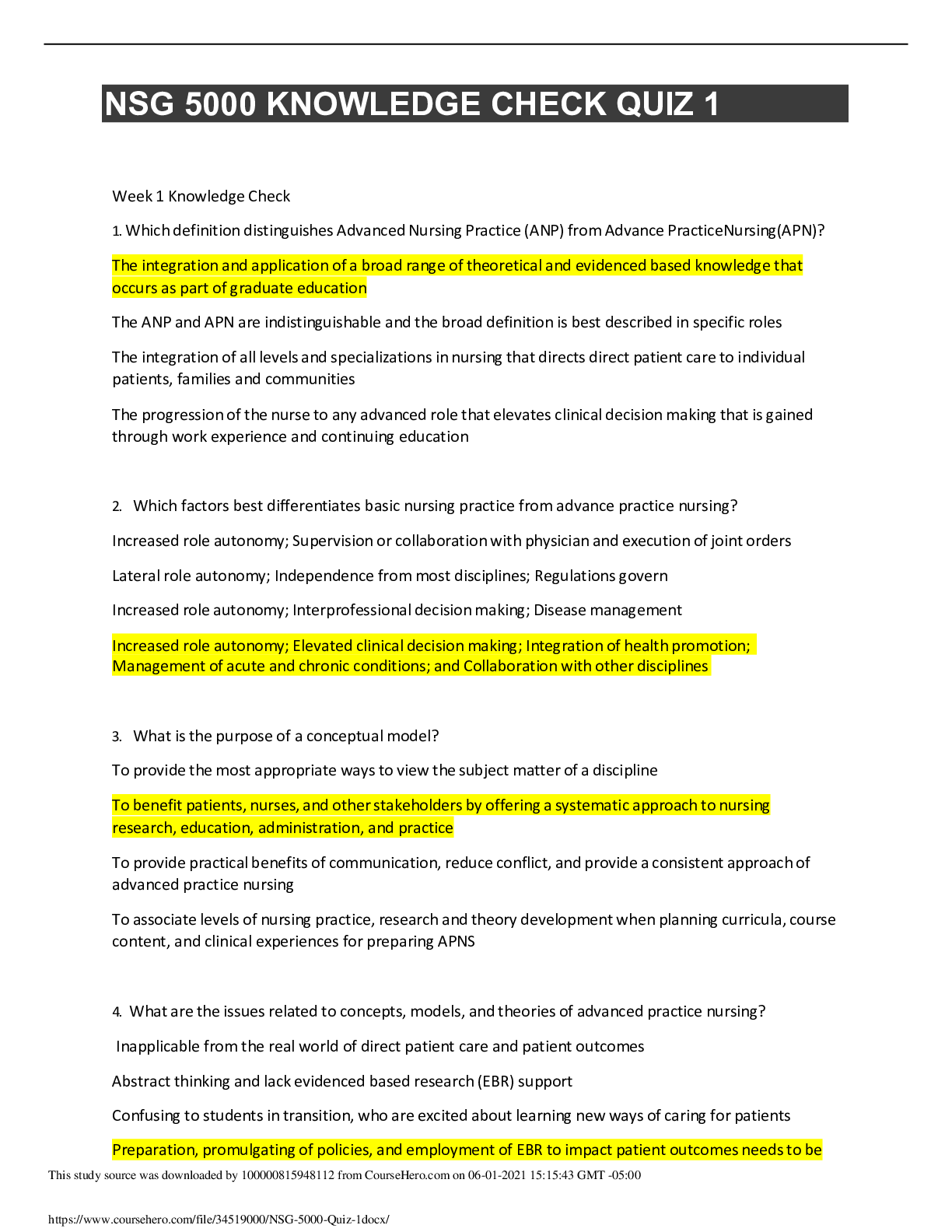
Buy this document to get the full access instantly
Instant Download Access after purchase
Add to cartInstant download
We Accept:

Reviews( 0 )
$23.00
Document information
Connected school, study & course
About the document
Uploaded On
Jun 01, 2021
Number of pages
3
Written in
Additional information
This document has been written for:
Uploaded
Jun 01, 2021
Downloads
0
Views
31

